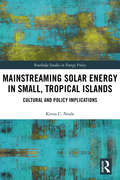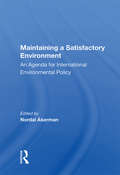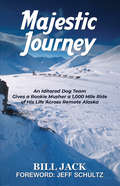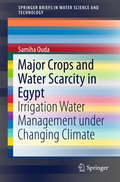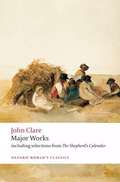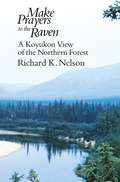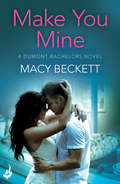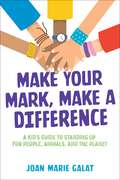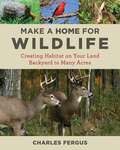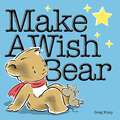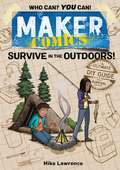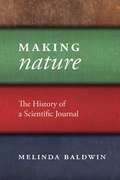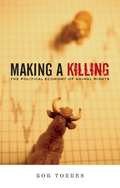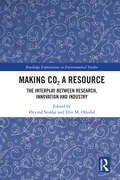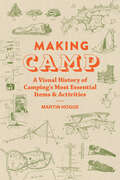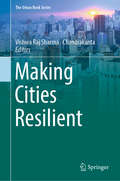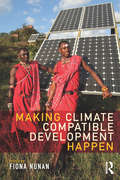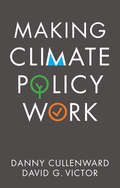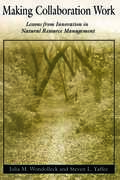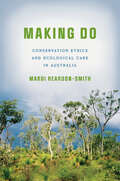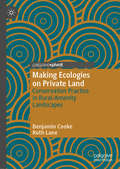- Table View
- List View
Mainstreaming Solar Energy in Small, Tropical Islands: Cultural and Policy Implications (Routledge Studies in Energy Policy)
by Kiron C. NealeThis book explores how cultural considerations can improve policymaking to achieve mainstream solar energy in small, tropical islands. Focusing on Trinidad, Barbados and Oʻahu, Kiron C. Neale looks at how culture can affect and be affected by the policies that support the household adoption of two key energy technologies: solar water heating and photovoltaics. Drawing on interviews with residents and energy officials, and an examination of the institutional, socio-economic and physical factors that affect energy systems such as governance structures and energy resource availability, the author explores themes including the impact of insularity on energy transitions and behavioural and cultural change. Overall, this book rebrands policies as instruments of cultural change and puts forward recommendations applicable to all small, tropical islands. Following the islands’ transition to renewable energy, this book will be of great interest to scholars of energy policy, energy transitions, climate change, cultural studies and small states development, as well as industry professionals working on energy policy implementation.
Maintaining A Satisfactory Environment: An Agenda For International Environmental Policy
by Nordal ÅkermanThis book is an outcome of a seminar organized to discuss an agenda for saving the environment of Europe. It covers the issues in international environmental policy and explores how to achieve an integration of environmental policies with other governmental policies and through economic instruments.
Majestic Journey: An Iditarod Dog Team Gives a Rookie Musher a 1,000 Mile Ride of His Life Across Remote Alaska
by Bill JackTake an exhilarating ride on the sled runners behind a dog team across 1,000 miles of the Iditarod sled dog race. Crossing Alaska's vast and remote wilderness, you will understand what the Iditarod is really like. As the sled dogs move you silently across Alaska's massive landscapes, you will be overwhelmed with the size and beauty of it all. In addition, you will find out what these amazing sled dogs are capable of. At the same time, you will be witnessing their incredible love for running. Besides being entertained, you just may be motivated to attempt a new adventure of your own.
Major Crops and Water Scarcity in Egypt
by Samiha OudaThis book includes multi-disciplinary quantifications of the effect of climate change on water requirements of wheat, maize, rice and sugarcane. Furthermore, it provides on-farm management that faces water scarcity under current situation and under climate change. Changing cultivation method (raised beds instead of furrows or basins) or increasing irrigation application efficiency (sprinkler or drip systems instead of surface irrigation) can reduce the applied water. Irrigated agriculture, although profitable, it endures wasteful use of valuable water resources. Taking into account the risk of climate change, developing countries like Egypt will highly suffer. Furthermore, the effect of intercropping (two crops use the applied water to one of them), and/or using crop rotations (arrange crops to reduce the applied water, increase water productivity and sustain soil fertility) on production and consumed irrigation water by crops were comprehensively analyzed.
Major Works
by Eric Robinson David Powell John Clare Tom PaulinThis authoritative edition was originally published in the acclaimed Oxford Authors series under the general editorship of Frank Kermode. It brings together a generous selection of Clare's poetry and prose, including autobiographical writings and letters. John Clare (1793-1864) is now recognized as one of the greatest English Romantic poets, after years of indifference and neglect. Clare was an impoverished agricultural laborer, whose genius was generally not appreciated by his contemporaries, and his later mental instability further contributed to his loss of critical esteem. But the extraordinary range of his poetical gifts has restored him to the company of his contemporaries Byron, Keats, and Shelley, and this fine selection illustrates all aspects of his talent. It contains poems from all stages of his career, including love poetry, and bird and nature poems. Written in his native Northamptonshire, Clare's work provides a fascinating reflection of rural society, often underscored by his own sense of isolation and despair. Clare's writings are here presented with the minimum of editorial interference, and with a new Introduction by the poet and scholar Tom Paulin.
Make Ink: A Forager's Guide to Natural Inkmaking
by Jason Logan“The pigments he concocts from these humble beginnings are as fun to make as they are eye-opening to work with . . . the world never quite looks the same.” —MarthaStewart.comA 2018 Best Book of the Year—The GuardianThe Toronto Ink Company was founded in 2014 by designer and artist Jason Logan as a citizen science experiment to make eco-friendly, urban ink from street-harvested pigments. In Make Ink, Logan delves into the history of inkmaking and the science of distilling pigment from the natural world. Readers will learn how to forage for materials such as soot, rust, cigarette butts, peach pits, and black walnut, then how to mix, test, and transform these ingredients into rich, vibrant inks that are sensitive to both place and environment. Organized by color, and featuring lovely minimalist photography throughout, Make Ink combines science, art, and craft to instill the basics of ink making and demonstrate the beauty and necessity of engaging with one of mankind’s oldest tools of communication.“Logan demystifies the process, encouraging experimentation and taking a fresh look at urban environments.” —NPR“The book is full of inspiration and takes a lot of the mystery out of ink making, at least at its simplest level. And it also reminds me why I love ink—any ink or liquid color as much as I do.” —The Well-Appointed Desk“Quite a few recipes . . . that use color from the kitchen: carrots, black beans, blueberries, turmeric, and onion skins all make beautiful ink colors.” —Design Observer“Make Ink opens up about methods, providing an open source guide to DIY ink.” —CityLab
Make Prayers to the Raven: A Koyukon View of the Northern Forest
by Richard K. Nelson“A thorough and elegant account of the mystical connection between Native Americans and the natural world.” —Outside“This admirable reflection on the natural history of the Koyukon River drainage in Alaska is founded on knowledge the author gained as a student of the Koyukon culture, indigenous to that region. He presents these Athapascan views of the land—principally of its animals and Koyukon relationships with those creatures—together with a measured account of his own experiences and doubts. . . . For someone in search of a native American expression of 'ecology' and natural history, I can think of no better place to begin than with this work.” —Orion Nature Quarterly“Far from being a romantic attempt to pass on the spiritual lore of Native Americans for a quick fix by others, this is a very serious ethnographic study of some Alaskan Indians in the Northern Forest area. . . . [Nelson] has painstakingly regarded their views of earth, sky, water, mammals and every creeping thing that creepeth upon the earth. He does admire their love of nature and spirit. Those who see the world through his eyes using their eyes will likely come away with new respect for the boreal forest and those who live with it and in it, not against it.” —The Christian Century“Nelson's presentation also gives rich insights into the Koyukon subsistence cycle through the year and into the hardships of life in this northern region. The book is written with both brain and heart. . . . This book represents a landmark: never before has the integration of American Indians with their environment been so well spelled out.” —Journal of Forest History
Make You Mine: Dumont Bachelors 1 (Dumont Bachelors #2)
by Macy BeckettWelcome to the Louisiana Bayou and the world of Macy Beckett's series, where hopeful hearts will go to great lengths to change their luck in love... Fans of Jill Shalvis, Carly Phillips and Rachel Gibson will love Macy's sexy heat and humour!For ninety-nine years, every man in the Dumont family has remained a perpetual bachelor. Residents of Cedar Bayou, Louisiana, whisper about a voodoo hex cast upon the family, sabotaging each man's chance at marriage. In truth, the Dumont men have their own player personalities to blame, and Marc is no exception. As captain of his family's riverboat, he's broken hearts up and down the Mississippi. That is, until his high school crush strolls onboard... Allie Mauvais rocks the boat when she fills in as his pastry chef. She hasn't seen Marc since senior year, when rumors flew that her great-great-grandmother was the one who cursed the Dumonts. After two weeks on the water, neither can deny the attraction that still burns between them. But to truly reach Marc's heart, Allie must show him that the hex is all in his head and it'll take more than her mouthwatering sweets to prove it. Will Allie's love be enough to finally make Marc hers?Don't miss more from the spellbinding Dumont Bachelors in Make You Blush and Make You Remember.
Make You Remember: Dumont Bachelors 2 (Dumont Bachelors #3)
by Macy BeckettWelcome to the Louisiana Bayou and the world of Macy Beckett's series, where hopeful hearts will go to great lengths to change their luck in love... Fans of Jill Shalvis, Carly Phillips and Rachel Gibson will love Macy's sexy heat and humour!Ten years ago, Beau Dumont made the biggest mistake of his life by letting his high school sweetheart, Devyn Mauvais slip through his fingers. Now the reformed bad boy will stop at nothing to get her back. Even if it means tricking her into taking a job on his family's riverboat, The Belle of the Bayou.When Devyn's old flame offers her a stint at the boat's day care center, she sees it as a chance to prove she isn't just the descendant of Louisiana's most infamous voodoo queen. Besides, it beats leading ghost tours around New Orleans. Yet when it comes to Beau, Devyn's all business. She won't give the sweet-talking playboy another chance to break her heart.But there's no escaping temptation in such close quarters, and Beau won't be satisfied with a few hot nights with the girl he's always loved. As he strives to make Devyn remember the good times, will his passion and heart be enough to regain her trust? Don't miss more from the spellbinding Dumont Bachelors in Make You Blush and Make You Mine.
Make Your Mark, Make a Difference: A Kid's Guide to Standing Up for People, Animals, and the Planet
by Joan Marie GalatTake the first steps into activism with this comprehensive middle grade guide that empowers readers to choose and become knowledgeable in a cause they are most passionate to reform, and to create meaningful change through learning what&’s already been accomplished—and what can still be done.Getting involved can be an overwhelming prospect, but this guide provides readers with tools to become informed and effective activists with an accessible approach offering hope and perspective. From Black Lives Matter and light pollution to climate change and healthcare equity for all, the book leads readers through an overview of issues, an essential human rights background, and stories of how other young activists tackle local, national, and international problems. Readers will discover a multitude of ways to build change and learn that every contribution matters.
Make Your Own Wreaths: For Any Occasion in Any Season
by Nancy AlexanderWhy wait for the holidays when you can adorn your home with a variety of beautiful wreaths all year long! Floral wreaths add a special accent to your home, but can be expensive to buy. Save money and express your creativity by learning to make your own wreaths with this step-by-step guide--so detailed, it is the only book on wreath-making you'll ever need!
Make a Home for Wildlife: Creating Habitat on Your Land Backyard to Many Acres
by Charles FergusMake a Home for Wildlife helps you see your property in new ways and is the resource you need to take the sometimes daunting steps to improve the quality of your land.According to U.S. Forest Service, 250 million acres of woods and forests in the U.S. are privately held by 10 million individuals/families. Whether you live on a quarter-acre lot in the suburbs, own a 20-acre woodland retreat, run a farm of 100 acres, or belong to an outdoor club with hundreds or thousands of acres, you can make changes to the land, improvements that will turn your property into a better home for wildlife. Habitat projects can be simple or complex, short-term or spanning decades. Cost can be minimal, a few hours of your time spent doing pleasant work in the outdoors, or can run into the hundreds or thousands of dollars. And there is funding to help landowners make wildlife habitat.Focusing on the eastern US, from Canada to Florida and west to the Great Plains, this book describes basic habitat types—forest, shrublands, grasslands, and wetlands—and highlights over 150 select native and introduced trees, shrubs, and plants and explains how they are used or not by wildlife. The book includes 100+ profiles of prominent and interesting species of insects, reptiles, amphibians, birds, and mammals with info on animals and their habitat needs. Large and small mammals, resident and migratory birds, and insects are covered. Fergus relates stories of landowners who have made habitat in different states and regions in different ways.
Make a Wish Bear
by Greg FoleyA friendship book perfect for the holiday season One clear night, Bear makes a wish on a twinkling star and Mouse joins him in waiting for the wish to come true. But the other animals who come by all have advice for Bear. "Don't tell anyone," says Owl. "Close your eyes," says Fox. And Elephant suggests standing on one foot. Before long, all of Bear's friends are there. "What did you wish for?" asks Mouse. Bear's answer will bring a smile to even the very youngest readers. Simply told and wonderfully illustrated, Make a Wish Bear reminds readers what's most important in life--good friends.
Maker Comics: Survive in the Outdoors! (Maker Comics)
by Mike LawrenceIn this volume of Maker Comics, First Second's DIY graphic novel series, you'll find step-by-step instructions for seven projects that will help you survive in the wild!Sophia and Alonso have been packed off to their grandpa’s for a fishing trip, and they’re dreading spending a whole day in the woods without any cell service. But Grandpa opens their eyes to the wonders of the outdoors, and its dangers—from tick bites to hypothermia. And when a sprained ankle delays their return to civilization, the kids have to learn not only how to perform forest-friendly first aid, but how to safely spend the night in the woods when you don’t have a tent!Prepare yourself before you set off on your next adventure! Whether you’re hiking in the wilderness or camping in your own backyard, Survive in the Outdoors! will equip you with the know-how you need. In this book, you'll find step-by-step instructions on how to build a campfire, catch and clean a fish, make a shelter, and more!
Making "Nature": The History of a Scientific Journal
by Melinda BaldwinMaking "Nature" is the first book to chronicle the foundation and development of Nature, one of the world's most influential scientific institutions. Now nearing its hundred and fiftieth year of publication, Nature is the international benchmark for scientific publication. Its contributors include Charles Darwin, Ernest Rutherford, and Stephen Hawking, and it has published many of the most important discoveries in the history of science, including articles on the structure of DNA, the discovery of the neutron, the first cloning of a mammal, and the human genome. But how did Nature become such an essential institution? In Making "Nature," Melinda Baldwin charts the rich history of this extraordinary publication from its foundation in 1869 to current debates about online publishing and open access. This pioneering study not only tells Nature's story but also sheds light on much larger questions about the history of science publishing, changes in scientific communication, and shifting notions of "scientific community. " Nature, as Baldwin demonstrates, helped define what science is and what it means to be a scientist.
Making A Killing
by Bob TorresSuggest to the average leftist that animals should be part of broader liberation struggles and--once they stop laughing--you'll find yourself casually dismissed. With a focus on labor, property, and the life of commodities, Making a Killing contains key insights into the broad nature of domination, power, and hierarchy. It explores the intersections between human and animal oppressions in relation to the exploitative dynamics of capitalism. Combining nuts-and-bolts Marxist political economy, a pluralistic anarchist critique, as well as a searing assessment of the animal rights movement, Bob Torres challenges conventional anti-capitalist thinking and convincingly advocates for the abolition of animals in industry--and on the dinner plate.Making A Killing is sure to spark wide debate in the animal rights and anarchist movements for years to come.Table Of Contents:I Taking Equality SeriouslyII Chained CommoditiesIII Property, Violence, and the Roots of OppressionIV Animal Rights and WrongsV You Cannot Buy the RevolutionAdvance praise for Making A Killing"Bob Torres' Making a Killing draws a very straight line between capitalism and the oppressive system of animal agribusiness. Drawing from social anarchist theory, Torres provides a convincing argument that in order to fight animal exploitation, we must also fight capitalism and, in doing so, animal rights activists will need to reconsider their methods and redirect their focus. While his critiques of the animal rights movements' large organizations may not earn him friends in high places, such considerations are crucial to keeping the movement on track and for preventing stagnation.Making a Killing is an important work from a new voice in animal advocacy that will surely spark heated discussions amongst activists from all corners of the movement."--Ryan MacMichael, vegblog.org"In Making A Killing: The Political Economy of Animal Rights, Bob Torres takes an important and timely look at the animal rights movement, calling for a synthetic approach to all oppression, human and animal. His analytical framework draws together Marxism, social anarchist theory, and an abolitionist approach to animal rights to provide a timely social analysis that will no doubt have profound effects on the animal rights movement literature."--Gary L. FrancioneDistinguished Professor of Law, Rutgers University"Bob Torres's socioeconomic analysis of nonhuman animal use is a welcome and important addition to the understanding of human-nonhuman relations at the beginning of the 21st century. In particular, Making a Killing, makes vital a contribution to understanding the role of the property status of animals and the continuing strength of various welfarist positions on the ethics--and indeed the economics--of the human utilisation of other animals. Making a Killing will become required reading for social scientists and others interested in modern social movements and the socioeconomic forces that shape their activities and their claims-making."--Dr. Roger Yates, Lecturer in sociology at University College, Dublin, Republic of Ireland"This is the book I've been waiting for. Making A Killing is a rare and powerful example of first-rate scholarship, a searing critique, and lively declaration of the rights of animals and humans. You will walk away from this book with a clear understanding as to why social justice movements for people must take animal rights seriously, and vice versa. Bob Torres has forever deepened my thinking about these relationships."--David Naguib Pellow, vegetarian, animal rights and anti-racist activist, and Professor of Ethnic Studies, University of California, San Diego; and author of Garbage Wars: The Struggle for Environmental Justice in Chicago and Resisting Global Toxics: Transnational Movements for Environmental JusticeBob Torres is assistant professor of sociology at St. Lawrence University, received his PhD from Cornell, and is co-author of Vegan Freak: Being Vegan in a Non-Vegan World. His writings have appeared in Critical Sociology, The Journal of Latinos and Education...
Making Birdhouses: Easy and Advanced Projects
by Leon H. Baxter Gladstone CaliffThis practical guide for building birdhouses contains plans for more than fifty attractive and useful structures — from a one-room house for bluebirds to a forty-two-room structure for purple martins. In addition to instructions and diagrams for constructing houses for such avian varieties as robins, wrens and chickadees, the easy-to-follow text also provides suggestions for feeding devices, bird house materials, methods of finishing exteriors, and winter care for birds. An authoritative, how-to book that will appeal to beginning and veteran woodcrafters alike, Making Birdhouses also features a supplement with easy projects for novices — among them simple structures for woodpeckers, a box for robins, and an “A-frame” for nuthatches. Plans for houses made from such common objects as gourds, a flower pot, tin cans, and an old lantern are also included.Detailed instructions and diagrams assure successful completion of projects that will satisfy builders as well as their feathered friends.
Making CO2 a Resource: The Interplay Between Research, Innovation and Industry (Routledge Explorations in Environmental Studies)
by Elin M. Oftedal Øyvind StokkeThis interdisciplinary book explores how CO2 can become a resource instead of a waste and, as such, be a tool to meet one of the grandest challenges humanity is facing: climate change.Drawing on a Norwegian narrative that has significance for a global audience, Øyvind Stokke and Elin Oftedal introduce in-depth, multi-perspective analyses of a sustainable innovation research experiment in industrial carbon capture and utilisation technologies. Building on extensive literature within marine sciences, sustainability research, and environmental philosophy and ethics, this book documents how a misplaced resource like CO2 can become valuable within a circular economy in its own right, while at the same time meeting the challenge of food security in a world where food production is increasingly under pressure. The book is diverse in scope and includes chapters on how to reduce the environmental footprint of aquaculture by replacing wild fish and soy from the Amazon, how to optimise the monitoring of aquatic environments via smart technologies, and how to replace materials otherwise sourced from natural environments. The authors also analyse the pivotal role of the university in driving innovation and entrepreneurship, the pitfalls of different carbon technologies, and explore how the link between petroleum dependence and CO2 emissions has been addressed in Norway specifically.Making CO2 a Resource will be of great interest to students and scholars of climate change, environmental ethics, environmental philosophy, sustainable business and innovation, and sustainable development more broadly.
Making Camp: A Visual History of Camping's Most Essential Items and Activities
by Martin HogueA visual exploration and history of one of America's favorite pastimes.Car camping, hike-in tent camping, bivouacking, mountaineering, RV camping, glamping, back yard camping . . . whatever your style, outdoor adventure awaits! For camping enthusiasts, this fascinating (and packable) volume holds a comprehensive look at the origins of the practice and the ways that bring all these enthusiasts together.From the early days of recreational camping in the late nineteenth century through the multitude of modern camping options available today, Making Camp explores the history and evolution of the popular activity through the lens of its most important and familiar components: the campsite, the campfire, the picnic table, the map, the tent, the sleeping bag, as well as the oft invisible systems for delivering water and managing trash.Find out how early nineteenth century German peasants fashioned rudimentary sleeping bags by burrowing into bags full of leaves for the night. Look back over several millennia to learn about the progression of tents from animal skins, goat's hair, and heavy canvas to featherweight nylon. Learn about the ways in which the skills to build and maintain a campfire have been displaced by the portable gas stove. Pinpoint the details of the essential campground map and its unique place in the camping imagination.Each chapter includes a broad range of visuals to help illustrate the rich history of camping and our collective devotion to it, including drawings, patents, diagrams, sketches, paintings, advertisements, and historical photographs. A must-have for avid campers, nature lovers, and all who seek to connect with the universe by sleeping under the stars.
Making Cities Resilient (The Urban Book Series)
by Chandrakanta Vishwa Raj SharmaAs the world has transformed, so have cities. Today, cities are home to 54 percent of the world’s population, and by the middle of this century that figure will likely rise to 66 percent. According to the United Nations (UN) Habitat I (1972), Habitat II (1996) and Habitat III (2016) summits, cities are facing many serious challenges, including growing inequality, security concerns and the worsening impacts of climate change. Uncontrolled urbanization has led to many problems (haphazard growth of areas, emergence of slums, inadequate water and power supply, poor sanitation, shortage of transport and other civic amenities, shrinking green spaces, pollution, crime, and urban disaster risks such as fire, flood, road and industrial accidents, etc.). Worldwide, communities at the international, national and local level are continuously working to improve human habitats. In order to make our planet more sustainable, the UN has moved from the Millennium Development Goals (MDG) to the Sustainable Development Goals (SDG). Among the latter, the aim of SDG 11 is to “…make cities and human settlements inclusive, safe, resilient and sustainable.” In light of these challenges, various terms have emerged to help understand urban issues. Visualizing the problem, the United Nations program “Making Cities Resilient” is focused on mitigating the disaster risk in urban areas. This book analyzes terms such as: sustainable, resilient, livable, inclusive, smart and world class city, which have emerged in the process of combating urban challenges in today’s world. The book addresses emerging concepts for cities, challenges and potentials, urban environments, health and planning/policies. Covering 14 large cities in India, as well as case studies from Japan, Singapore, Thailand, Malaysia, Poland and Sweden, it provides a regional dimension to and micro-level perspective on urban issues.
Making Climate Compatible Development Happen
by Fiona NunanMaking Climate Compatible Development Happen introduces readers to the concept of climate compatible development (CCD) through exploring what it might look like, how it could be achieved in practice and identifying challenges and dilemmas raised by CCD. The book brings together research that explores the assumptions underlying CCD and applies the concept in a range of geographic and sectoral settings. The volume makes a significant contribution to the theorisation and evidence-base for how development efforts can be made more climate resilient and with lower greenhouse gas emissions than a ‘business as usual’ approach. It provides critical reflections on the vision and conceptualisation of CCD, exploring how to encourage it, and what trade-offs and challenges may be encountered. The contributions discuss the feasibility of achieving CCD, mechanisms that may support progress towards it, challenges that may be experienced and the roles of, and impacts on, different stakeholder groups. Following a critical reflection on the concept of CCD, the potential nature of, and barriers to, CCD, it is examined in relation to agriculture, renewable energy, forestry, pastoralism, coastal areas and fisheries, with case studies taken from countries including Ghana, India, Kenya, Mongolia, Mozambique and Peru. The book provides a valuable cross-sectoral and international critical reflection on the theory and practice of CCD, and will be a resource for postgraduates, established scholars and undergraduates from any social science discipline, policymakers and practitioners studying or working on areas related to the interface between environment (climate change) and international development.
Making Climate Policy Work
by David G. Victor Danny CullenwardFor decades the world’s governments have struggled to move from talk to action on climate. Many now hope that growing public concern will lead to greater policy ambition, but progress depends on sound strategy. Yet the most widely promoted climate policy—the use of market-based programs to reduce climate pollution—hasn’t been working and isn’t ready to scale. Danny Cullenward and David Victor show why the elegant theory of markets has failed to have much impact in practice. The reasons, they argue, are deeply rooted in the politics of creating and maintaining effective markets—forces that have caused low prices and led to few climate benefits in nearly every program to date. These problems are structural and won’t disappear with increasing demand for climate solutions. Confronting them requires counterintuitive reforms, but even reformed markets are unlikely to drive the scale of change needed to stabilize the climate. Facing that reality, Cullenward and Victor argue, requires relying more heavily on regulation and industrial policy—strategies that ultimately turn on strengthened government capacities to deliver the benefits markets promise, but rarely deliver.
Making Collaboration Work: Lessons From Innovation In Natural Resource Management
by Julia M. Wondolleck Steven Lewis YaffeeAcross the United States, diverse groups are turning away from confrontation and toward collaboration in an attempt to tackle some of our nation's most intractable environmental problems. Government agencies, community groups, businesses, and private individuals have begun working together to solve common problems, resolve conflicts, and develop forward-thinking strategies for moving in a more sustainable direction.Making Collaboration Work examines those promising efforts. With a decade of research behind them, the authors offer an invaluable set of lessons on the role of collaboration in natural resource management and how to make it work. The book: explains why collaboration is an essential component of resource management describes barriers that must be understood and overcome presents eight themes that characterize successful efforts details the specific ways that groups can use those themes to achieve success provides advice on how to ensure accountability Drawing on lessons from nearly two hundred cases from around the country, the authors describe the experience in practical terms and offer specific advice for agencies and individuals interested in pursuing a collaborative approach. The images of success offered can provide ideas to those mired in traditional management styles and empower those seeking new approaches. While many of the examples involve natural resource professionals, the lessons hold true in a variety of public policy settings including public health, social services, and environmental protection, among others.Making Collaboration Work will be an invaluable source of ideas and inspiration for policy makers, managers and staff of government agencies and nongovernmental organizations, and community groups searching for more productive modes of interaction.
Making Do: Conservation Ethics and Ecological Care in Australia
by Mardi Reardon-SmithCape York is a remote and biodiverse peninsula in northeastern Australia that has been inhabited by Aboriginal communities for thousands of years. Since colonization, much of the peninsula has been used for large scale cattle farming. It is also a place of global significance as the site of multiple environmentally protected bioregions, with ongoing efforts to recognize them as UNESCO World Heritage Sites. Despite the very human role in shaping the landscape of Cape York, the region remains widely thought of as a "wilderness" to be conserved and protected. In this context, what counts as natural and native matters crucially—as does who gets to decide how species and people are categorized and, accordingly, how they are controlled. Based on long-term field research with Aboriginal traditional owners, settler-descended cattle herders, and park rangers, Making Do investigates complex ways in which people form, maintain, and transform relationships to changing environments. How do we know the places in which we live, and how do we care for them among the ruptures created by forces like climate change, settler colonialism, and structural inequalities? To address these questions, Mardi Reardon-Smith traces issues such as the history of land tenure changes, the identification and control of weeds and feral pigs, and wildfires and Aboriginal cultural burning. Mardi Reardon-Smith argues that caring for land, a sprawling, messy, and sometimes violent process, is not just about repair, restoration, or maintenance—rather, it is about bringing into being workable landscapes, livable worlds, and possible futures.
Making Ecologies on Private Land: Conservation Practice in Rural-Amenity Landscapes
by Ruth Lane Benjamin CookeThis book explores conservation practices on private land, based on research conducted with landholders in the hinterlands of Melbourne, Australia. It examines how conservation is pursued as an intimate interaction between people and ecologies, suggesting that local ecologies are lively participants in this process, rather than simply the object of conservation, and that landholders develop their ideas of environmental stewardship through this interaction. The book also explores the consequences of private property as a form of spatial organisation for conservation practice; the role of formative interactions with ecologies in producing durable experiential knowledge; how the possibilities for contemporary conservation practice are shaped by historical landscape modification; and how landholders engage with conservation covenants and payment schemes as part of their conservation practice. The authors conclude with ideas on how goals and approaches to private land conservation might be reframed amid calls for just social and ecological outcomes in an era of rapid environmental change.
